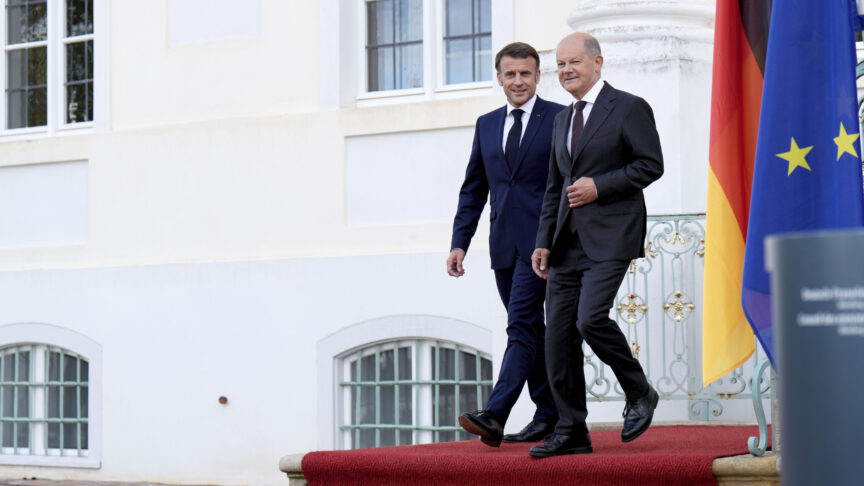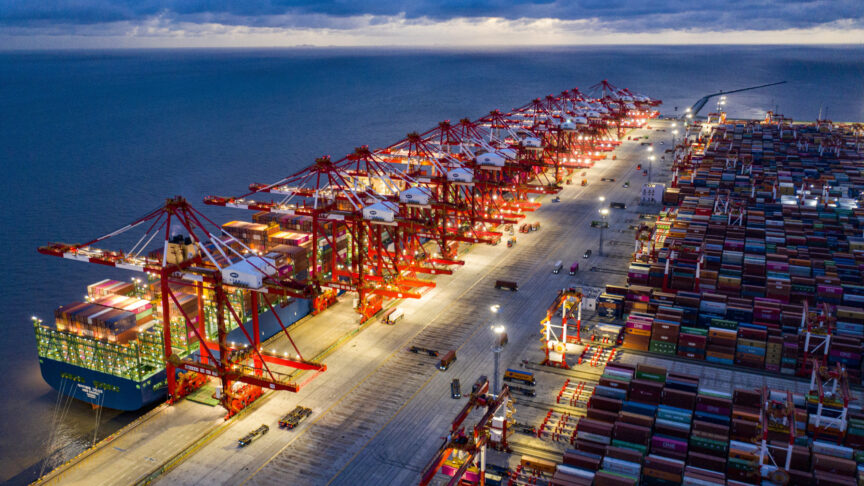Macron and the French Paradox
While commentators focused largely on negative aspects, France has seen an unprecedentedly pro-European electoral campaign.
Everyone interested in health and good eating has heard of the “French paradox”. In South-west France, people live to a healthy old age on a fairly fatty diet of foie gras and duck confit. They manage this because they also ingest more fresh fruit and vegetables than anywhere else.
The ongoing French election is producing a similar paradox. Le Pen, Mélenchon, and other fringe candidates have provided an overdose of negativity as they attempted to slay all sorts of sacred cows of the French establishment, including “outsiders”, “globalization”, and “Europe”. Negativity or anxiety can be harmful, and outside observers have been focusing at it. Fewer commentators have paid attention to the healthy part of the campaign: a mixture of strict diets (“austerity”) from traditional conservatives, and the funky fusion vegan regime that Macron symbolizes so well.
The positivity on Europe is without precedent. Emmanuel Macron has been campaigning visibly and without reservation for Europe, even advocating deeper European integration. Although it remained largely unnoticed, Benoît Hamon, the sacrificial candidate of the Socialist Party, had an equally strong and positive European theme, with a focus on social issues. No previous candidate, including former President Giscard d’Estaing who did the most for European integration during his term, placed Europe so prominently at the centre of his campaigns. Even François Fillon — a former sovereigntist at the time of the 1992 Maastricht referendum — came out in favour of Europe, albeit with a vision of an intergovernmental Europe where the European institutions were relegated to the shadows.
In previous campaigns, the issue of Europe played a very different role. Chirac and Jospin sought to present themselves as the most effective advocates for France inside of Europe — a stance that did not do much to counter public distrust of Europe. Giscard and Mitterrand emphasized peace and security, and therefore Franco-German relations, in the tradition of De Gaulle. Sarkozy and Hollande were swallowed by the financial crisis and its aftermath, and barely touched Europe. The first resorted to the Franco-German axis as a (losing) argument for his re-election campaign; the second largely did Europe by stealth, unable to muster the courage to deal with it head on.
2017 has been different. In a campaign in which nationalist rhetoric was ubiquitous, Macron dared to buck the nativist trend . He explicitly made the case for Europe—and did so at times in Berlin and in English! Macron’s approach presented challenges for everybody. For the unreformed French, Macron’s message highlighted that Germany had prospered in Europe to a degree that France had not managed. But Macron also challenged Germany when he noted that “the euro today is a sort of weak Deutschmark.” And for all those who were ready to dismiss an “ever closer union”, he voiced support for a “Europe of sovereignty”. On treaty reforms — currently a taboo subject in European politics — he clearly said that changes will be required on issues such as ending the unanimity rule in European council voting to introducing a European list for candidates to the European Parliament.
Political commentators generally view these ideas as political death in the national debate. Two generations of national politicians have internalized the notion that pro-European positions win no votes. But the same politicians kept a sense of balance — treating Europe as at least a necessary evil, or even as a useful amplifier of national interests. Macron’s luck (and ours) is that Le Pen has taken this traditional approach too far. She gets her policy recipes from a book of national exorcism and a list of union claims for benefits. Even though voters are moved by some of these themes, a majority of the French know that they are impractical and exaggerated (globalism is not about to erase French identity, for example.) Worse, they reflect a deep historical pessimism. Emmanuel Macron, by contrast, represents the way out, a hopeful future, in a country which polls have shown to be the most pessimistic of all Western democracies.
The run-off campaign will be short and merciless. Marine Le Pen and Emmanuel Macron present a very clear divide in national politics. Macron has not won yet and he has been remarkably short on the actual ways and means to deliver a more influential Europe and one that helps to solve the national slump. He has clearly broached — to Germany, in particular — the idea of a reciprocal deal: French economic reforms in exchange for a looser German monetary and fiscal policy. That makes two targets to persuade: the perennially anti-reform French and a German political class that is itself nearing election time — never a good moment to make concessions to the outside world.
But let’s face it, the direct, Thatcherite route to reform is closed off. Austerity and self-sacrifice are neither in the genes of French voters nor apparently in the heart of those who advocated it. A victory by Macron would be a giant step forward for the deepening of the European core — and in fact a direct challenge to German leaders to make good on the federalist and integrative aspirations that they sometimes exhibit. The converse — a “flexible” Europe as preached by Wolfgang Schäuble — creates a risk of eroding institutions, rules and consensus.
We should hope that Macron gathers enough strength to implement his ideas, not only because the current alternative is Le Pen. In many ways, their duel clears the fog and the ambiguity that most national politicians have lived in. For the first time, we may have a clear electoral win for deeper European integration and a European sovereignty. That opportunity should not be neglected.
The European Council on Foreign Relations does not take collective positions. ECFR publications only represent the views of their individual authors.


